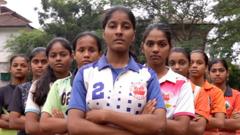The fellowship aids Paik's research and advocacy for social justice, focusing on the intersection of caste and gender.
**Shailaja Paik: A Trailblazer in the Fight Against Caste Discrimination**

**Shailaja Paik: A Trailblazer in the Fight Against Caste Discrimination**
Celebrated historian Shailaja Paik is awarded the MacArthur "genius" fellowship, shining a light on the struggles of Dalit women.
Shailaja Paik, a professor of history at the University of Cincinnati, has made waves in scholarly and activist circles with her groundbreaking research on Dalit women in India. Originally from the slums of Pune, she has risen to prominence, recently being recognized as one of the 22 recipients of the prestigious MacArthur "genius" fellowship. This honor comes with an $800,000 stipend spread over five years and validates Paik's commitment to unraveling the complex narratives tied to caste and gender in India.
Paik's childhood memories are filled with hardships — cramped living conditions, lack of basic amenities, and the stigma of being part of a marginalized community. Yet, she credits her parents for instilling in her the value of education as a pathway to liberation. As she reflects on her journey, she emphasizes that the challenges shaped her understanding of the systemic oppression faced by many Dalit women.
The MacArthur Foundation commended her for illuminating the continued struggles against caste discrimination. "Through her multifaceted research," stated the Foundation, "Paik delves into the intricate experiences of Dalit women, shedding light on the persistent nature of untouchability." In a world where these conversations often remain suppressed, Paik's work creates a platform for global dialogue on social justice issues.
Her academic achievements are significant, with her first book, "Dalit Women's Education in Modern India," addressing the compounded discrimination faced by Dalit women. Her second publication, "The Vulgarity of Caste: Dalits, Sexuality, and Humanity in Modern India," earned her the prestigious John F. Richards Prize. In her writings, she highlights the historical disenfranchisement of the Dalit community, underscoring the importance of education and social equity.
While addressing the disparities perpetuated by the caste system, Paik emphasizes the necessity for individuals in privileged positions to acknowledge these issues globally. Her experiences navigating academia, often contrasting with peers fluent in English, resonated with many scholars from marginalized communities. She advocates for institutions to implement support systems that uplift these voices, allowing for a more diverse representation in academia.
Looking ahead, Paik intends to leverage the MacArthur fellowship for further research and advocacy work to combat caste-based discrimination. "It is my hope that this fellowship empowers both Dalits and non-Dalits in their fight against casteism," she said. By engaging in collaborative efforts with fellow scholars, she aims to forge new pathways for social justice, ensuring the stories and struggles of Dalit women are heard beyond the confines of their communities.
Paik's childhood memories are filled with hardships — cramped living conditions, lack of basic amenities, and the stigma of being part of a marginalized community. Yet, she credits her parents for instilling in her the value of education as a pathway to liberation. As she reflects on her journey, she emphasizes that the challenges shaped her understanding of the systemic oppression faced by many Dalit women.
The MacArthur Foundation commended her for illuminating the continued struggles against caste discrimination. "Through her multifaceted research," stated the Foundation, "Paik delves into the intricate experiences of Dalit women, shedding light on the persistent nature of untouchability." In a world where these conversations often remain suppressed, Paik's work creates a platform for global dialogue on social justice issues.
Her academic achievements are significant, with her first book, "Dalit Women's Education in Modern India," addressing the compounded discrimination faced by Dalit women. Her second publication, "The Vulgarity of Caste: Dalits, Sexuality, and Humanity in Modern India," earned her the prestigious John F. Richards Prize. In her writings, she highlights the historical disenfranchisement of the Dalit community, underscoring the importance of education and social equity.
While addressing the disparities perpetuated by the caste system, Paik emphasizes the necessity for individuals in privileged positions to acknowledge these issues globally. Her experiences navigating academia, often contrasting with peers fluent in English, resonated with many scholars from marginalized communities. She advocates for institutions to implement support systems that uplift these voices, allowing for a more diverse representation in academia.
Looking ahead, Paik intends to leverage the MacArthur fellowship for further research and advocacy work to combat caste-based discrimination. "It is my hope that this fellowship empowers both Dalits and non-Dalits in their fight against casteism," she said. By engaging in collaborative efforts with fellow scholars, she aims to forge new pathways for social justice, ensuring the stories and struggles of Dalit women are heard beyond the confines of their communities.






















